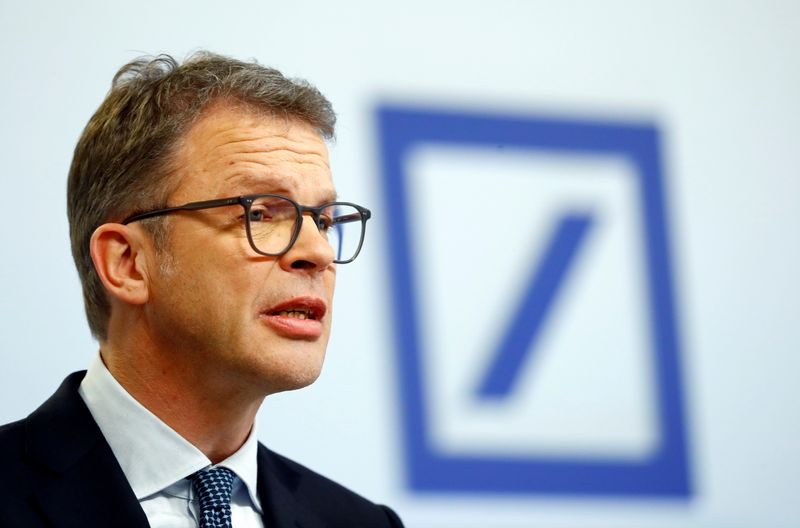Exclusive: Regulators press Deutsche Bank CEO to drop investment bank role – sources By Reuters

By Tom Sims and Patricia Uhlig
FRANKFURT (Reuters) – Regulators are pressing Deutsche Bank (DE:DBKGn) CEO Christian Sewing to relinquish day-to-day oversight of its sprawling investment bank, two people with knowledge of the matter said.
European Central Bank officials have held conversations with Deutsche Bank managers, including Sewing, in which they said the CEO should delegate direct control of the division to another board member, according to the sources, who were involved in or briefed on the discussions.
It was unclear when regulators last voiced their concerns directly, but the two people said over the past week that the bank was well aware of their position, with one adding that contact with Deutsche was “constant”.
They said regulators fear Sewing has too much on his plate, leaving the investment bank open to operational hazards. While they want Sewing to hand over day-to-say oversight to another manager, he would retain ultimate responsibility as group CEO under their proposals, the sources said.
Deutsche Bank declined to comment on Sewing’s role or any conversations with the ECB on the CEO giving up direct control of the investment banking division.
Germany’s biggest bank is one of the few major banks in the world to assign day-to-day oversight of investment banking to its chief executive. At most banks, other board members oversee the division.
The investment bank is the German lender’s profit driver, but also the centre of risk for a bank that is deemed one of the most critical to the functioning of the global financial system.
Such regulatory concerns come as Deutsche Bank is carrying out an internal investigation, which three separate sources familiar with the matter said was into the suspected mis-selling of risky investment bank products to customers in Spain and elsewhere.
The alleged wrongdoing happened as recently as last year, and stretched back to at least 2018, one of those sources said, which would put it under Sewing’s watch.
In response to queries about the probe into possible mis-selling of high-risk products, the bank reiterated its previous statement. “We initiated an investigation in relation to our engagement with a limited number of clients,” it said, declining to comment further because the probe is ongoing.
INVESTMENT BANKING BOOMS
One of the two people with knowledge of the conversations with regulators said Deutsche Bank’s internal probe, revealed this month, had hardened the regulators’ resolve to tackle Sewing’s overarching day-to-day duties. But the ECB has long viewed the arrangement with scepticism, while Deutsche Bank has resisted changing, according to both sources.
In situations like these the ECB, the euro zone banking supervisor and Deutsche’s chief regulator, primarily relies on the power of persuasion to get its way.
Such power can be significant, however, because a good working relationship with the powerful central bank is critical for running the bank. ECB supervisors make decisions on capital requirements, dispatch auditors to lenders and have sway over bonus and dividend payouts.
At Deutsche, a New York-based banker, who does not sit on the management board, is in charge of the investment bank and reports to Sewing. But Sewing is responsible for briefing the board on the division’s activities and also gets involved in hiring decisions and client meetings.
Sewing, who joined Deutsche in his teens, took control of the investment bank in 2019, a year into his tenure as CEO, in a management reshuffle and overhaul of global operations.
Regulators made their concerns known at the time and were assured that the setup would be temporary in order to put a new management structure in place but Deutsche has since taken no action, the sources said.
Several months later, in September 2019, the bank said in a public statement that speculation that Sewing would relinquish his investment bank role was false.
When Sewing took the helm of the investment bank, it was viewed as Deutsche’s problem child following declines in revenue and scandals involving the sale of mortgage securities and the laundering of money from Russia. Deutsche managers said they would focus more on old-fashioned retail and corporate banking.
It hasn’t worked out that way. In 2020, the COVID-19 pandemic created so much volatility in markets that businesses like bond trading made the investment bank the group’s biggest profit engine by far.
As a result, Deutsche may have eked out a small profit for 2020, its first since 2014, according to a consensus forecast of analysts ahead of a Feb. 4 earnings report.
“A very good part, a substantial part of the outperformance which we have seen in 2020 is deemed sustainable,” Sewing told investors last month.

